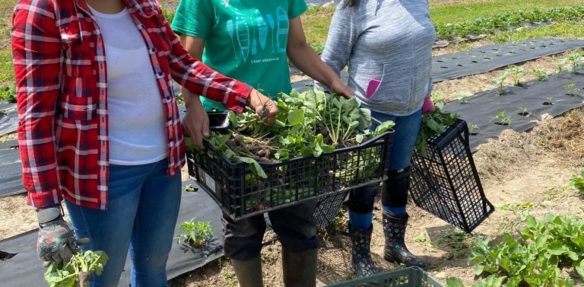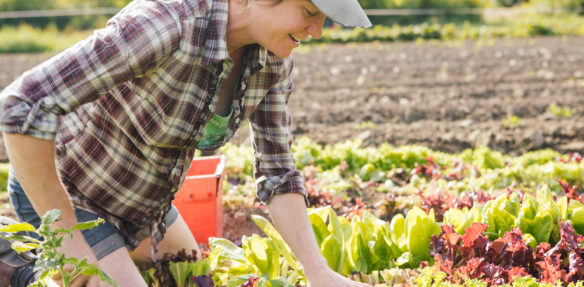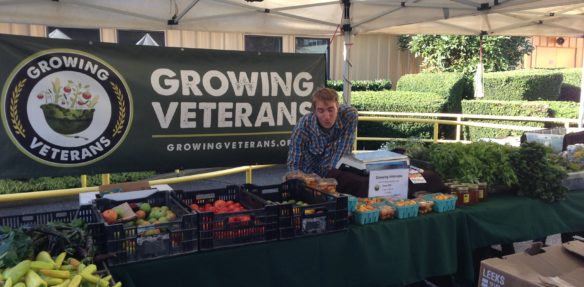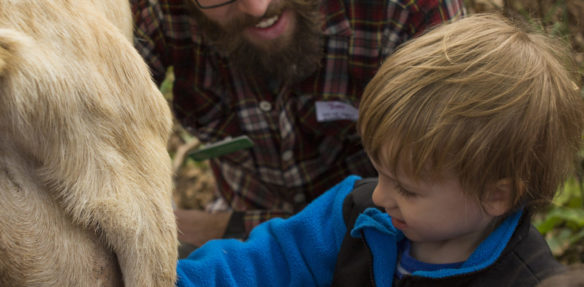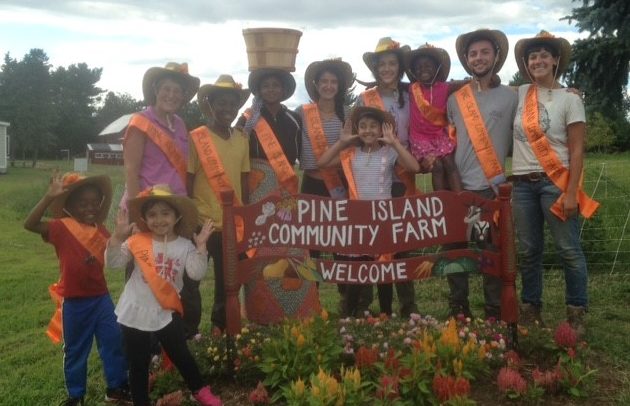
“Raising local meat, nurturing the fragile floodplain, and connecting people to the land.”
-Pine Island Community Farm
The Backstory
Located just outside of Burlington, the 230 acres that now comprise the Pine Island Community Farm originally belonged to a farmer named Peter Fitzgerald. After he passed away, the younger members of his family were not interested in farming the land and the Vermont Land Trust (VLT) was able to purchase the land at auction. The Pine Island property was located just miles away from the Burlington and Winooski refugee resettlement communities. Burlington and Winooski have become home to “New Americans” – people who fled violence, torture, and ethnic cleansing in their own countries and arrived to the United States as legally-recognized refugees. New Americans in the Burlington area come primarily from Vietnam, Bosnia, Bhutan, and Somalia, but some come from Burma, Iraq, Sudan, the Democratic Republic of Congo, Rwanda, and Burundi. Many of these New Americans were farmers or herders in their own countries, but lost their land and livestock due to political upheaval.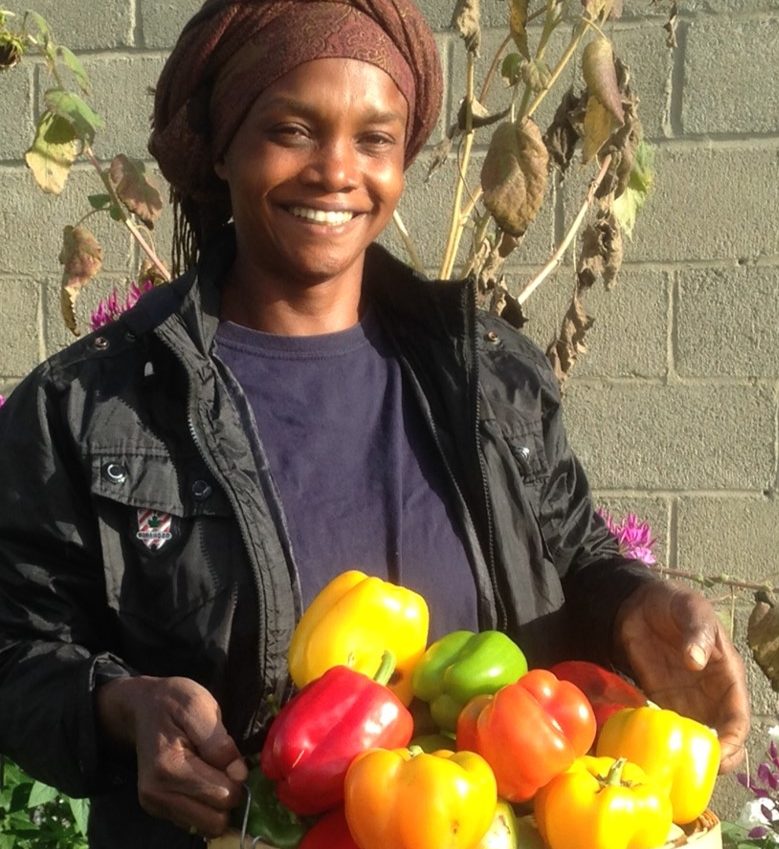
Many New Americans in Burlington and Winooski encountered difficulties obtaining fresh, locally-raised meat – especially goat meat – as well as vegetables native to their own countries. The challenges of procuring and slaughtering their own goats were monumental and included driving several hours throughout New England while struggling with directions and language barriers. In addition to buying fresh meat, the refugee community was also purchasing anywhere from 300,000 to 1.5 million pounds of frozen goat meat per year in the Burlington Old North End ethnic stores, the vast majority of which came from New Zealand and Australia. The New American communities also looked to buy fresh, tasty, but tough chickens for their ethnic cuisines of curries and other sauces. Similarly, they wanted land to grow vegetables from their own countries, but could not find enough land for community or personal gardens.
The Vision
Rather than purchasing imported meat shipped halfway across the world, New American families began talking with the Vermont Refugee Resettlement Program (VRRP) and the Association for Africans Living in Vermont (AALV) about the possibility of raising their own goat meat to feed their families and to satisfy the demand for fresh, local goat meat in other refugee communities. Refugee families, organizer Karen Freudenberger (initiator of the Pine Island concept), and the organizations assisting them began envisioning a way to “meet the demand for locally produced and culturally significant foods, as well as provide a locale where people can deepen their relationships with the land, nurture cultural values and traditions, and broaden their community connections.”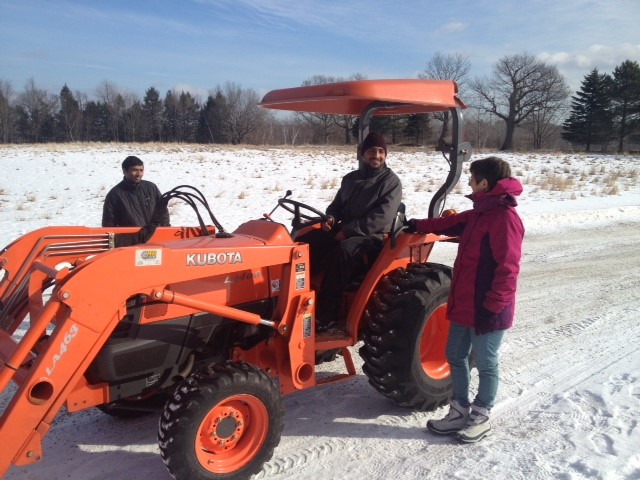
The Arrangement
The Manager & The Organizations
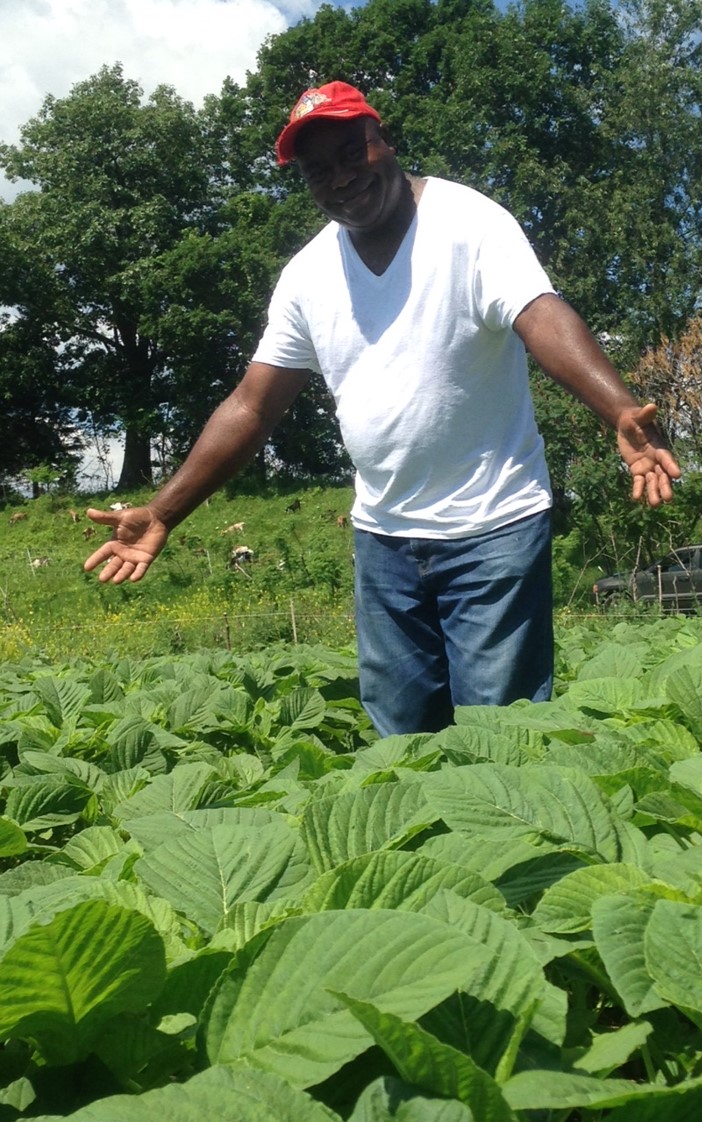 Visionary advocate Karen Freudenberger was the instigator of the Pine Island concept, and through her dedicated efforts eventually became the farm manager of the Pine Island Community Farm venture. Karen died unexpectedly in December 2016, but not without laying strong foundations for this initiative. Today, dedicated volunteers continue her vision. Karen worked in international community development throughout her entire career and moved to Vermont in 2009 after having lived for 11 years in Madagascar and having worked early in her career as a Peace Corps volunteer in Senegal, West Africa. Karen had been talking to local refugee families and searching for land for a goat collaborative for a few years before the project got off the ground. She talked with service providers at UVM Extension and at the Intervale, but ran into several dead ends. However, Karen’s networking paid off because when Intervale learned of VLT’s purchase of the Fitzgerald plot at auction, Intervale passed along the sale information. Karen immediately prepared and pitched a proposal to VLT for the land.
Visionary advocate Karen Freudenberger was the instigator of the Pine Island concept, and through her dedicated efforts eventually became the farm manager of the Pine Island Community Farm venture. Karen died unexpectedly in December 2016, but not without laying strong foundations for this initiative. Today, dedicated volunteers continue her vision. Karen worked in international community development throughout her entire career and moved to Vermont in 2009 after having lived for 11 years in Madagascar and having worked early in her career as a Peace Corps volunteer in Senegal, West Africa. Karen had been talking to local refugee families and searching for land for a goat collaborative for a few years before the project got off the ground. She talked with service providers at UVM Extension and at the Intervale, but ran into several dead ends. However, Karen’s networking paid off because when Intervale learned of VLT’s purchase of the Fitzgerald plot at auction, Intervale passed along the sale information. Karen immediately prepared and pitched a proposal to VLT for the land.
Soon after, VLT partnered with AALV – a social services agency providing assistance to refugees in the Burlington area – and offered the 230 acres of land to AALV under a no-cost, five-year lease to allow the project to get underway. Pursuant to the arrangement with VLT, 80 acres of the land in the Winooski River floodplain are used for grazing, 8 acres are used for vegetable production by about 60 New American families, an area is set aside for a pilot beekeeping venture, and the remaining acres consisting of wetlands and vegetated buffers are set aside for ecological restoration and floodplain protection. The property also contains two houses, one of which is a new energy efficient VERMOD house with solar panels. Solar panels were installed on the roof of the barn. The farm is now nearly totally self-sufficient with respect to electricity. Pine Island Community Farm was established as the overarching organization and has federal 501(c)(3) and Vermont nonprofit status. Karen was able to secure grants available to organizations working with low-income populations in addition to a USDA community food grant to assist with funding the project, purchasing farm equipment, repairing the farm infrastructure, and adding solar panels.
The Farmers
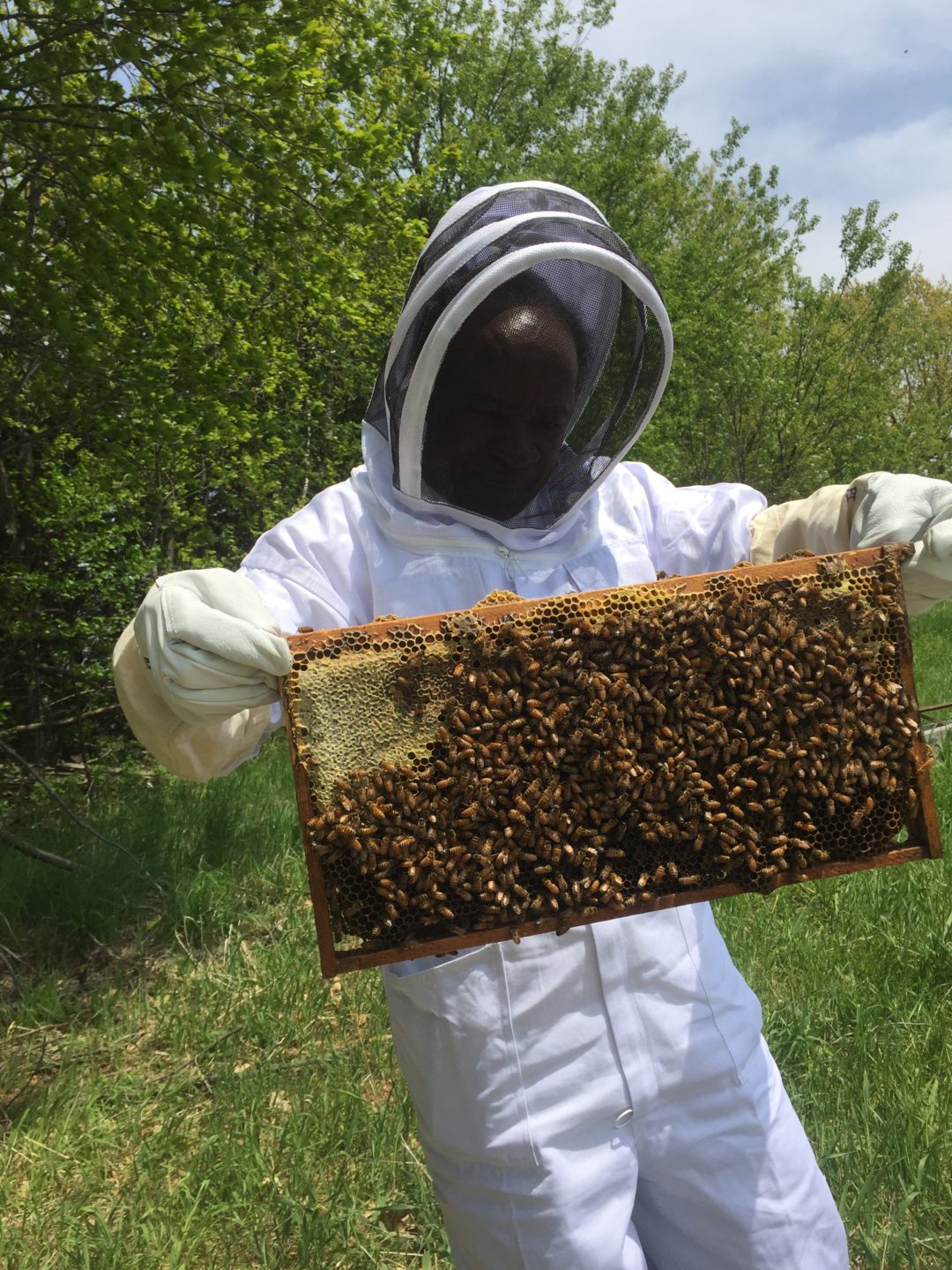 Chuda Dhaurali and his wife Gita, refugees from Bhutan who resettled in Vermont in 2009, began raising goats on Pine Island Community Farm in 2013. Chuda’s father had a large, diversified farming operation in Bhutan. Chuda raised 80 goats his first season and began working to create what was initially called the Vermont Goat Collaborative. The following season, he expanded his herd to 120 goats, and now raises about 350 goats per year. He also purchases and resells spent goats from Vermont dairy farmers. Prior to settling in Vermont in 2009, Chuda spent 20 years living in a refugee camp in Nepal. Now he lives in one of the two houses on the 230-acre plot with his wife Gita and their two children, raising food for his family’s and the community’s consumption.
Chuda Dhaurali and his wife Gita, refugees from Bhutan who resettled in Vermont in 2009, began raising goats on Pine Island Community Farm in 2013. Chuda’s father had a large, diversified farming operation in Bhutan. Chuda raised 80 goats his first season and began working to create what was initially called the Vermont Goat Collaborative. The following season, he expanded his herd to 120 goats, and now raises about 350 goats per year. He also purchases and resells spent goats from Vermont dairy farmers. Prior to settling in Vermont in 2009, Chuda spent 20 years living in a refugee camp in Nepal. Now he lives in one of the two houses on the 230-acre plot with his wife Gita and their two children, raising food for his family’s and the community’s consumption.
Theogène and his wife Hyacinthe fled genocide in Rwanda in 2004 and arrived in Colchester as part of the Vermont Refugee Resettlement Program. They and their four children moved into the second farmhouse on the Pine Island property in 2014 and began raising goats, chickens, and vegetables as a separate business but as Collaborative members. Over time, Theogène decided it was more efficient to specialize in raising chickens – up to 1,000 per year as allowed by Vermont law – through purchasing chicks, growing them on pastures grazed earlier by the goats, and then selling them directly to New Americans who slaughter the chickens on site. His wife not only helps to manage the chicken operation, she has also become a successful vegetable farmer selling surplus throughout the growing season and freezing vegetables for sale during the winter.
Chuda and Gita and Theogène and Hyacinthe operate their businesses as individual farming enterprises. As such, the families pay income taxes on their own individual businesses. However, the families are members of the Collaborative, which allows them to share farm equipment, farm space, and barn space. In 2014, the two families together raised over 250 goats, but now Chuda has not only expanded to about 350 goats per year raised on the land, but also buys other goats and fattens them up. Chuda usually purchases very young goats – by sale or donation – from several different Vermont goat dairy operations that have no use for young male goats (“bucklings”). Theogène purchases his chicks by mail order from a supplier in Pennsylvania and has experimented with different varieties to find the most palatable for the New American buyers.
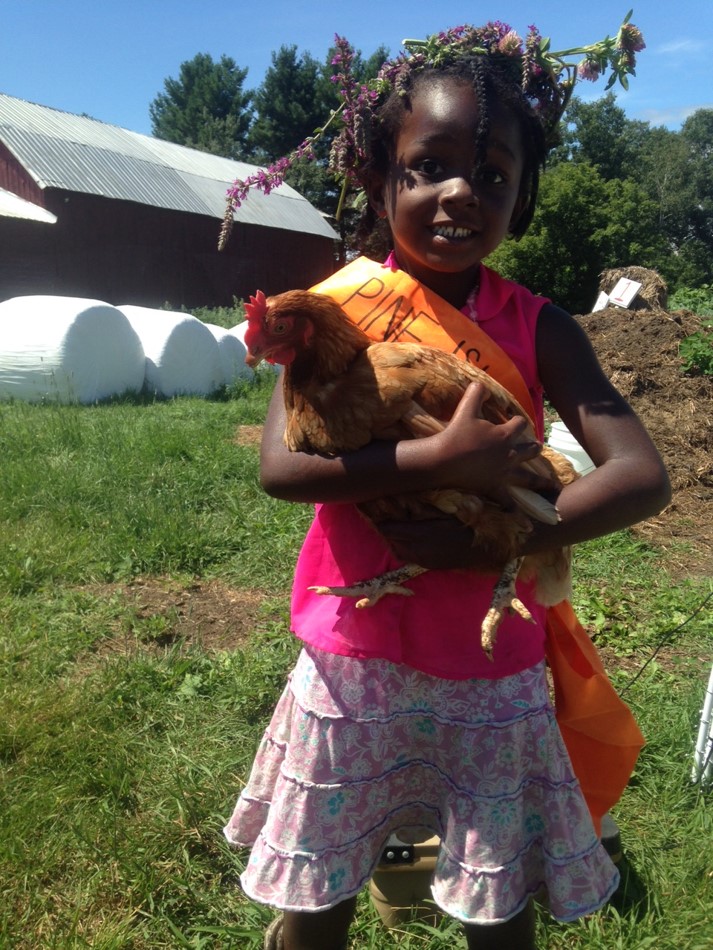
In addition to the two goat-raising families, Pine Island also has about 60 families raising vegetables on 1/8 acre community garden plots and three families raising vegetables on 1/2 acre plots. Many of the families grow for their own personal consumption but also commercially, selling their produce to ethnic markets and restaurants in the Burlington and Boston areas. Most families have purchased large freezers in order to market vegetables throughout the winter.
Additionally, two Burundian men, Jean-Marie and Francois, are piloting a beekeeping project with a volunteer at the farm. Together, the three men have four hives and are finishing out their second season. Beekeeping is a challenging endeavor given the various elements working against bees, including harsh Vermont winters, increasing insect diseases directly associated with a warming climate, and the use of pesticides on surrounding farms. Thus, the beekeepers rely heavily on other beekeepers in the area to build their knowledge base of managing bees in the given environment.
Farm Governance
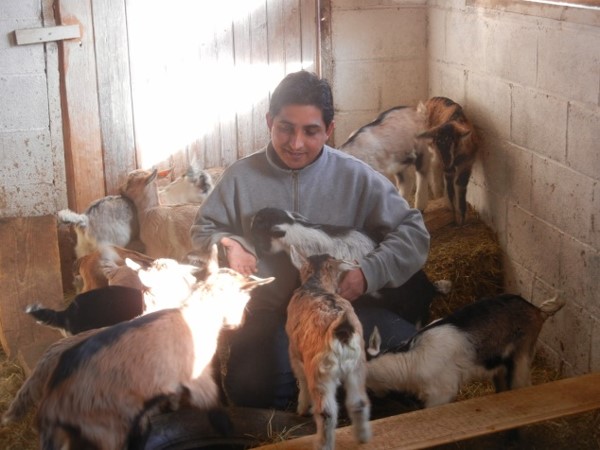 The goat- and chicken-raising families sign the Pine Island Community Farm Member Agreement, which states that the family agrees to follow the rules of the organization and pay a fee back to the Collaborative consisting of roughly 10% of the family’s profits for the year. The chicken-raising families pay rent for use of the two houses, but they do not pay agricultural land rent to Pine Island Community Farm. Rather, the Member Agreement provides that the farmers are responsible for managing their individual enterprises and are expected to continue farming the land so long as VLT holds title to it. The above-described fees and rent pay for Pine Island’s recurring costs, which include land taxes, insurance, and farm equipment maintenance. So long as Pine Island leases the land from VLT, Pine Island Community Farm will grant farmers license to use the land (in accordance with the Pine Island bylaws). Families using the community garden plots pay an annual flat fee of $90, put down a $50 deposit (returnable at the end of the season), and agree to abide by the terms of the Member Agreement. Three primary cultural affinity groups in the gardens – Somali Bantu, Bhutanese, and Swahili – are collaboratively led by group-appointed Garden Leaders. These leaders are the conduits for communication of successes and challenges. The Garden Leaders also support and maintain community expectations, and they organize affinity group volunteers. In addition, the Pine Island Collaborative allows people who purchase a goat to make use of the slaughter room by paying an annual user fee. Similarly, chickens may be slaughtered and cleaned on site, though no more than 1,000 can be harvested this way unless the farm invests in other types of slaughter facilities.
The goat- and chicken-raising families sign the Pine Island Community Farm Member Agreement, which states that the family agrees to follow the rules of the organization and pay a fee back to the Collaborative consisting of roughly 10% of the family’s profits for the year. The chicken-raising families pay rent for use of the two houses, but they do not pay agricultural land rent to Pine Island Community Farm. Rather, the Member Agreement provides that the farmers are responsible for managing their individual enterprises and are expected to continue farming the land so long as VLT holds title to it. The above-described fees and rent pay for Pine Island’s recurring costs, which include land taxes, insurance, and farm equipment maintenance. So long as Pine Island leases the land from VLT, Pine Island Community Farm will grant farmers license to use the land (in accordance with the Pine Island bylaws). Families using the community garden plots pay an annual flat fee of $90, put down a $50 deposit (returnable at the end of the season), and agree to abide by the terms of the Member Agreement. Three primary cultural affinity groups in the gardens – Somali Bantu, Bhutanese, and Swahili – are collaboratively led by group-appointed Garden Leaders. These leaders are the conduits for communication of successes and challenges. The Garden Leaders also support and maintain community expectations, and they organize affinity group volunteers. In addition, the Pine Island Collaborative allows people who purchase a goat to make use of the slaughter room by paying an annual user fee. Similarly, chickens may be slaughtered and cleaned on site, though no more than 1,000 can be harvested this way unless the farm invests in other types of slaughter facilities.
The Future
While the death of visionary leader Karen Freudenberger was an unexpected blow, the Pine Island Community Farm is turning out to be financially profitable for all parties. A recent financial evaluation suggested opportunities for growth, and now the challenge is to explore how to expand goat and chicken production. The goat herd and haying operations can be expanded to meet the strong community demand for fresh goat meat, but new investments would be needed for an improved barn and a larger year-round slaughter house facility. Local zoning prohibits building a third house on the property, but farm buildings can be added. Demand for fresh, tasty, and tough chicken raised on the grazing fields is very high, but improved processing facilities are required by law if chicken production is to grow significantly. Capital investments would be quite high to meet stringent environmental requirements. Discussions are under way regarding how to transfer the VLT-owned land to the nonprofit Pine Island Community Farm so that the goat and chicken growers can continue their operations, and so that vegetable producers can also continue the highly popular seasonal vegetable production. The waiting list is long for those wanting to do vegetable production, but suitable land is not available. Discussions are also under way to create a conservation easement along the Winooski River, though a buffer zone has been created that limits grazing along the river and significant tree planting has already occurred.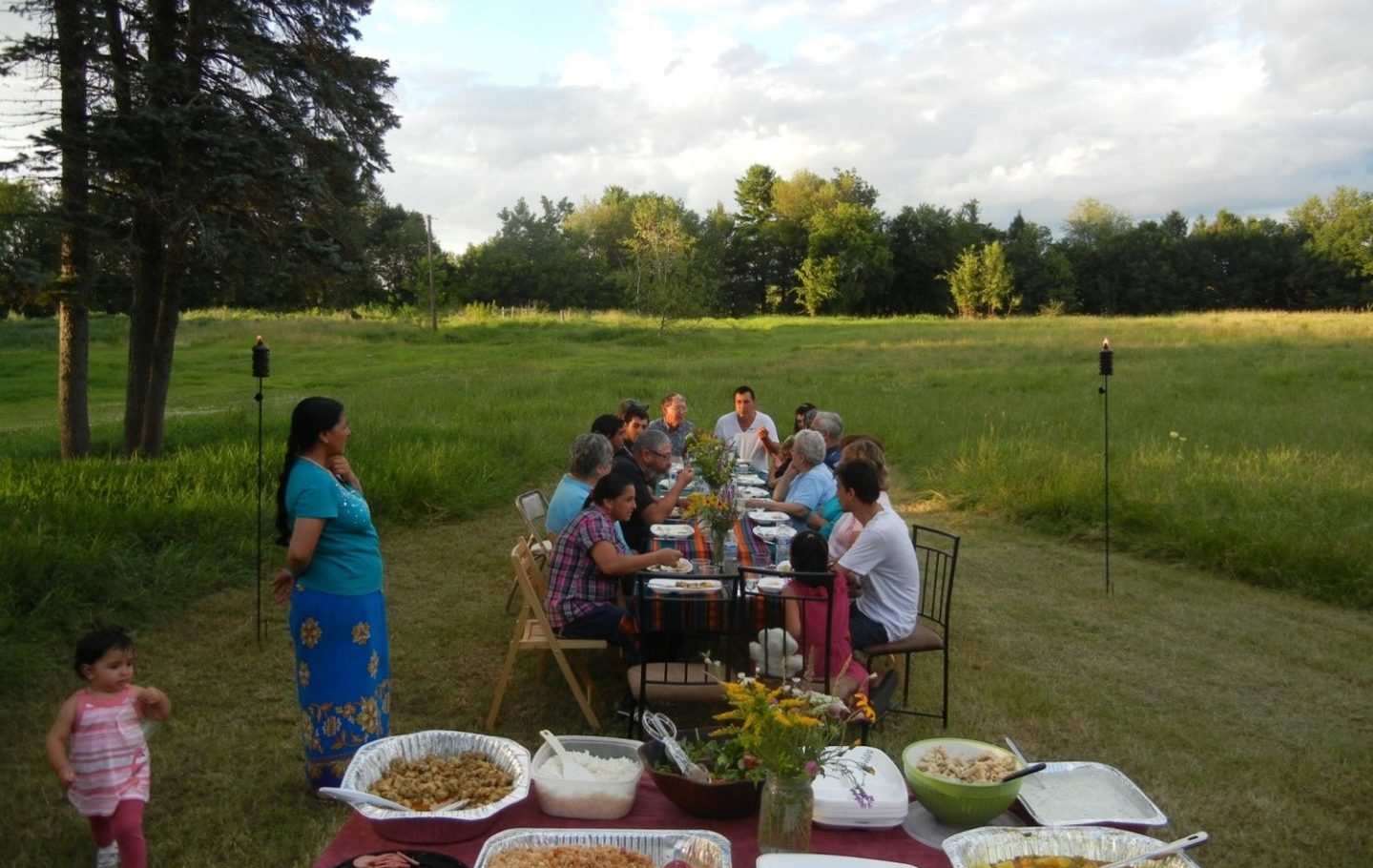
Prior to Karen’s passing, the Pine Island Community Farm completed the legal arrangements to become a member-managed LLC with nonprofit status, consisting of producer-members (those raising vegetables, chickens, and goats) as well as consumer/user-members (those purchasing animals/vegetables, using the slaughter room, etc.). Now the challenge is to create a strong, sustainable, and dynamic governing board that would most likely hire a farm manager to help coordinate the various collaborative enterprise ventures and carry out administrative tasks. Once the Pine Island Community Farm can demonstrate that it can govern itself, cover its taxes, insurance, and maintenance on the property, then VLT may transfer the property free of charge to the nonprofit.
